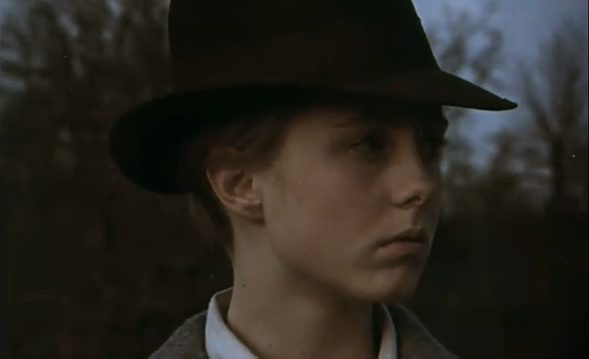A Sorta Fairytale: Louis Malle’s Black Moon

Few films evoke the dream state as convincingly as Louis Malle’s Black Moon (1975). We’re not talking about Technicolor escapades or gauzy reveries, paranoiac nightmares à l‘Aronofsky or David Lynch’s twisted film noir funhouses, or even the strategically political subversions of the 20th century’s great cinematic surrealist, Luis Buñuel.
Those directors play head games that lure and dazzle, leaving the viewer in a half-awake interzone. Malle’s sustained foray into the rabbit hole, on the other hand, flat-out makes you want to pinch yourself. It’s all there: the uncanny compression of time and space; the non-sequitur logic; the strange inconsequence of speech; the sense of things being barely out of reach, or constantly disappearing through doors and around corners; the matter-of-fact way in which incredible, even horrifying, phenomena present themselves; even the absence of sunlight, an effect achieved here with help from the legendary cinematographer Sven Nykvist—brilliantly, and without tampering too much with them, Malle has imported a cartload of elements from that parallel universe we sometimes inhabit during sleep.
The early going has wisps of Goldilocks, but the obvious predecessor of Malle’s autumn-toned fairy tale is Alice in Wonderland. A teenage girl (Cathryn Harrison), fleeing a war between men and women that has spilled into the countryside, takes refuge in an old farmhouse inhabited by talking animals, naked children, a mute pair of androgynous siblings (Alexandra Stewart and Joe Dalessandro), and a bedridden old harridan (Thérèse Giehse). There is no narrative to speak of, Malle’s intention (as he explains in a short documentary that accompanies Criterion’s new reissue) being that “the characters’ mysterious behavior itself would become the story.”
And so it does, as a less traditional form of suspense sinks its teeth in. Lily literally feels her way through her surroundings, burning her hand on a pot (as one might expect) and then (as one might not) recoiling when a patch of flowers she treads on cries out in pain. The old lady in bed berates her, reports her movements on a two-way radio, cackles when Lily’s underpants suddenly fall down around her ankles. Black Moon is rich with “opaque metaphors that both defy and demand critical scrutiny,” Ginette Vincendeau writes in the new edition’s liner notes. Many of those metaphors are laden with adolescent anxiety; is the frisson of familiarity that accompanies so much of Black Moon evidence that such insecurities never really fade?
There’s an elusive, disappointingly frumpy unicorn, and a profusion of slithering snakes and caterpillars; Lily is beaten down by angry toddlers, but quells them with her piano-playing in an extended sequence near the end. Compare the solemnity of the chaos here with Malle’s Zazie dans le Métro (1960), also out on DVD and Blu-Ray today, a deliriously nonsensical Parisian adventure borrowed from the imagination of a provincial girl who hasn’t yet reached puberty. Zazie predates the gender wars that had, by the time Malle made Black Moon, had rocked Western society and perhaps also entered Malle’s dreams. The latter film was inspired in part by one he had of Giehse, with whom he’d just finished filming Lacombe, Lucien, occupying his bed. She does that here, magnificently-Malle filmed at his own estate in southwestern France. He probably didn’t dream of her suckling at the breasts of young women. But so much of Black Moon seems to arrive unmodified from behind that dusky curtain, it’s hard to say for sure.
BLACK MOON IS OUT NOW ON CRITERION DVD AND BLU-RAY. FOR MORE INFORMATION, VISIT THE CRITERION COLLECTION’S WEBSITE.






